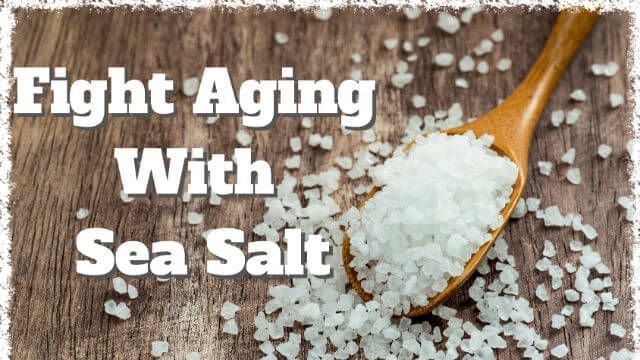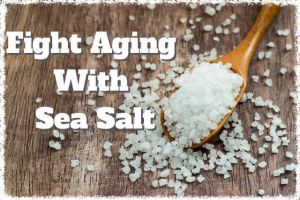
Many people try to avoid salt due to health and beauty concerns, thinking it might worsen hypertension or cause bloating. But did you know that salt is actually vital for human health? And the best way to incorporate it in your life is through sea salt, a variety of salt which has potent health, beauty and anti-aging benefits—especially for the skin. Here’s 7 ways sea salt can restore your skin, fight aging and support your health in general:
1. It prevents dehydration
You probably thought that drinking salty water would make you more thirsty, but as it turns out, sea salt can actually treat and prevent dehydration. Sea salt contains a ton of nutrients that our bodies need, so it’s the perfect way to replenish. And as we know, dehydration can make your skin look dryer and older, in addition to other physical symptoms like fatigue and headaches that leave you feeling less than optimal.
2. It Supports Soft and Smooth Skin
Studies have shown that sea salt can reduce the appearance of wrinkles and leave skin looking and feeling smooth, soft and young. A German study, for example, found that taking baths in sea salt increased skin hydration and decreased skin redness and roughness. You can also exfoliate with sea salt; the minerals in the sea salt are actually used as ingredients in many high-end spa treatments. Just make sure your salts are smooth, and not sharp or rough, or scrubbing with them may irritate your skin.
3. It’s Detoxifying
An acidic body can cause premature aging and disease in the body. Sea salt is highly alkalizing, and can help rid the body of harmful toxins and acids. You can make your own detoxifying water by adding the juice of one lemon and 1.5 tsp of sea salt to 64 ounces of water.
4. It Increases Circulation
If you find your complexion looking dull, scrubbing with sea salt can help in two ways. Using a sea salt scrub will both exfoliate the skin and increase circulation, giving you a natural, youthful glow.
5. It Increases Skin Cell Regeneration
When you exfoliate with sea salt, not only do you increase circulation and free yourself from dead skin, scrubbing also supports skin regeneration and the growth of healthy new skin cells. When your skin regenerates, the result is firmer, younger and more even looking skin.
6. It Relieves Psoriasis and Eczema
If you’re experiencing dry and uncomfortable skin conditions like psoriasis or eczema, sea salt has been shown to both clear up current flares and breakouts and prevent future ones—but you have to use a lot for it to work! For the most effective treatment, add 1-2 lbs of salts to your bath water.
7. It Helps You Sleep
 Chronic stress and poor sleep can cause dark, puffy eyes and other signs of premature aging. If you’re having trouble sleeping, try relaxing and renewing in a hot sea salt bath. Sea salt is high in magnesium, a deficiency of which can contribute to poor sleep. Taking a hot bath with added sea salt allows you to relax, de-stress, and absorb magnesium all at the same time. For an even more sleep-inducing experience, try adding a relaxing essential oil like lavender.
Chronic stress and poor sleep can cause dark, puffy eyes and other signs of premature aging. If you’re having trouble sleeping, try relaxing and renewing in a hot sea salt bath. Sea salt is high in magnesium, a deficiency of which can contribute to poor sleep. Taking a hot bath with added sea salt allows you to relax, de-stress, and absorb magnesium all at the same time. For an even more sleep-inducing experience, try adding a relaxing essential oil like lavender.
The Best Natural Salt
You can find many kinds of unrefined salt right in the store, but check the label, it must say “unrefined” – some sea salts are still refined. We like to use AztecSeaSalt, which is not sold in stores, to make Sole. We know for a fact that it is high-quality, unrefined, and loaded with the good minerals and nutrients you need. Learn more about AztecSeaSalt here.
Note: Always consult a health practitioner before beginning any natural health routine.
-The Alternative Daily
When shopping for sea salt, look for an unrefined sea salt. Unrefined sea salt retains all the natural minerals your body needs. The only sea salt we use in our kitchen is from Ava Jane’s Kitchen. Learn more and receive a special offer today!
Sources:
http://www.livestrong.com/article/158987-what-are-the-benefits-of-salt-scrubs
http://www.seasalthealth.com/tag/dehydration
http://www.ncbi.nlm.nih.gov/pubmed/15689218

